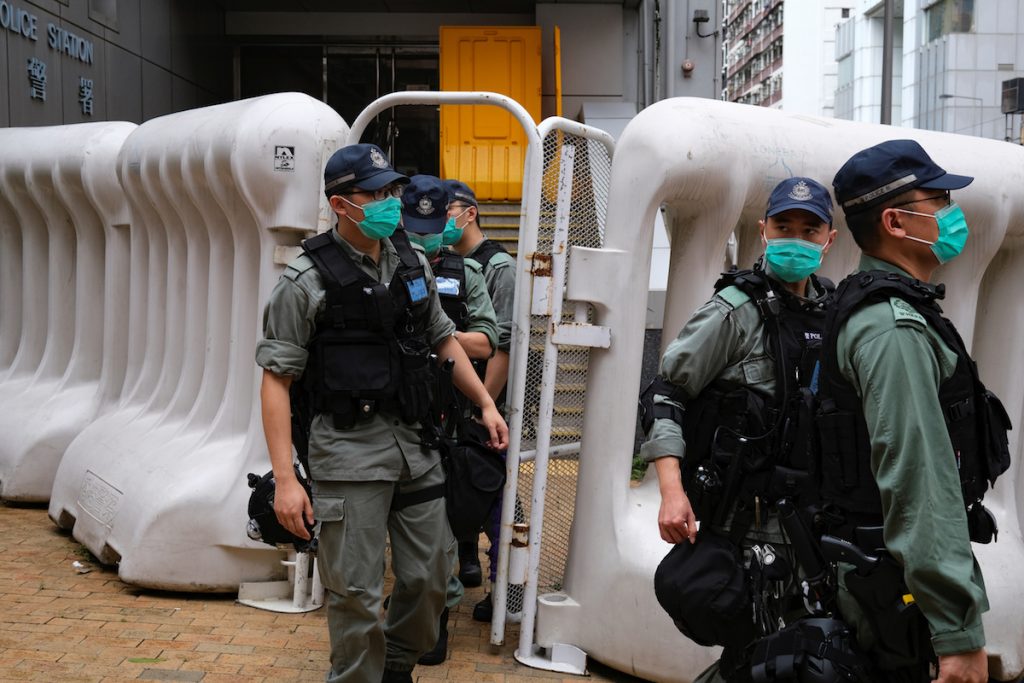A proposal to impose national security laws in Hong Kong could see mainland intelligence agencies set up bases in the global financial hub, raising fears of direct enforcement by Chinese authorities in the city and the prospect of fresh protests.
The details were unveiled on May 22, a day after Beijing proposed the new controversial national security legislation that critics see as an historical turning point for China’s freest city.
Hong Kong activists called on May 22 for people to rise up against the proposal, aimed at tackling secession, subversion, terrorism, and foreign interference, that has sent jitters across the business and diplomatic communities.
Foreign diplomats fear establishing new Beijing agencies in the Chinese-ruled city could give mainland security and intelligence officers enforcement powers that could potentially put rights and freedoms at risk.
Calls have emerged for flash mobs at night across the territory and democracy activists including Joshua Wong plan to meet the press to announce “street action” later on May 22.
“This is a great moment to reboot the protest,” said university student Kay, 24, who participated in last year’s mass scale and often violent anti-government and anti-Beijing protests which this year entered a lull due to the coronavirus.
Hong Kong leader Carrie Lam said her government will “fully cooperate” with the Chinese parliament to complete the legislation, which she said will not affect rights, freedoms nor judicial independence.
The proposed legislation could heighten tensions between Beijing and Washington, whose relationship is already frayed by trade disputes and reciprocal accusations over the pandemic.
U.S. President Donald Trump warned Washington would react “very strongly” if Beijing went ahead with the security law.
“It is starting to look like a U.S.-China summer of discontent in the making,” said Stephen Innes, chief global market strategist at AxiCorp.
Innes said the new law could potentially reignite the pro-democracy demonstrations of 2019, the biggest crisis the former British colony has faced since it returned to Chinese rule in 1997.

Draft proposal
The proposed legislation for Hong Kong requires the territory to quickly finish enacting national security regulations under its mini-constitution, the Basic law, according to a draft seen by Reuters.
The document said the laws will safeguard the central government’s “overall jurisdiction” as well as Hong Kong’s “high autonomy”.
“When needed, relevant national security organs of the Central People’s Government will set up agencies,” in Hong Kong to safeguard national security, the draft said.
Foreign diplomats say this could formalise and expand the presence of mainland security and intelligence services in Hong Kong. Currently they can take no enforcement action in the city.
A previous attempt to adopt similar legislation in 2003 was met with a protest that drew around half a million people onto the streets and was eventually shelved.
Pro-democracy activists and politicians have for years opposed the idea of national security laws, arguing they could erode the city’s high degree of autonomy, guaranteed under the “one country, two systems” handover agreement, which China says it is undermined by protesters.
“It is essentially declaring directly that ‘one country two systems’ is null and a failure,” said Eric Cheung, principal lecturer at Hong Kong University’s department of law.
Local pro-democracy lawmakers denounced the plans on the night of May 21 as “the end of Hong Kong”.
“Beijing is attempting to silence Hong Kongers’ critical voices with force and fear,” pro-democracy activist Joshua Wong tweeted. “Deep down protesters know, we insist not because we are strong, but because we have no other choice.”






